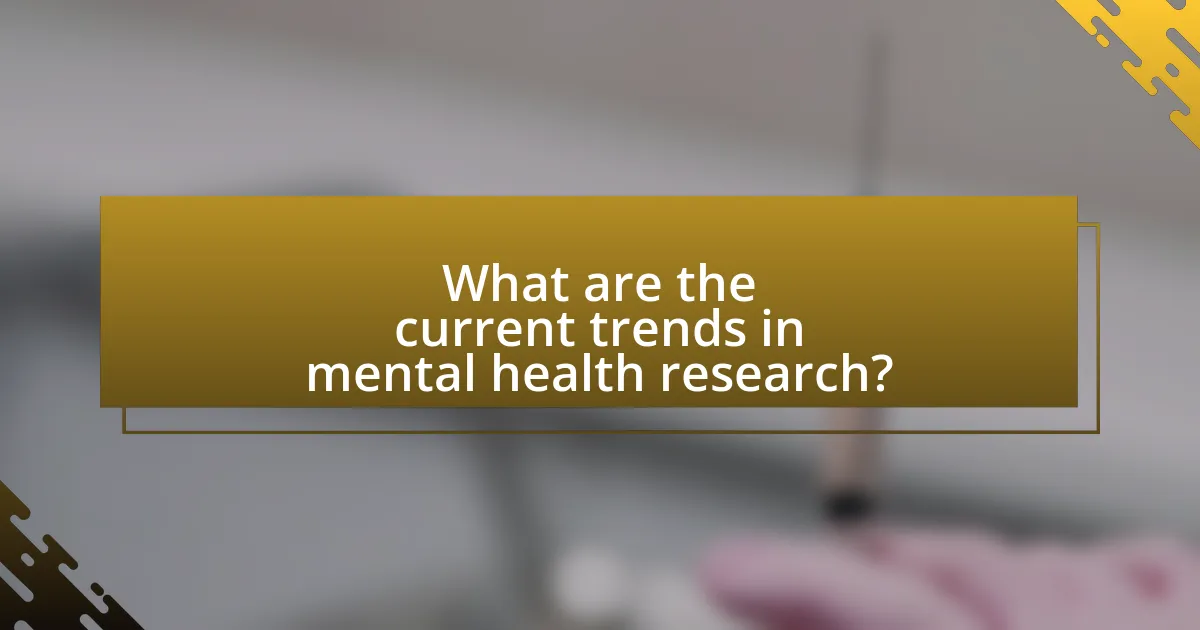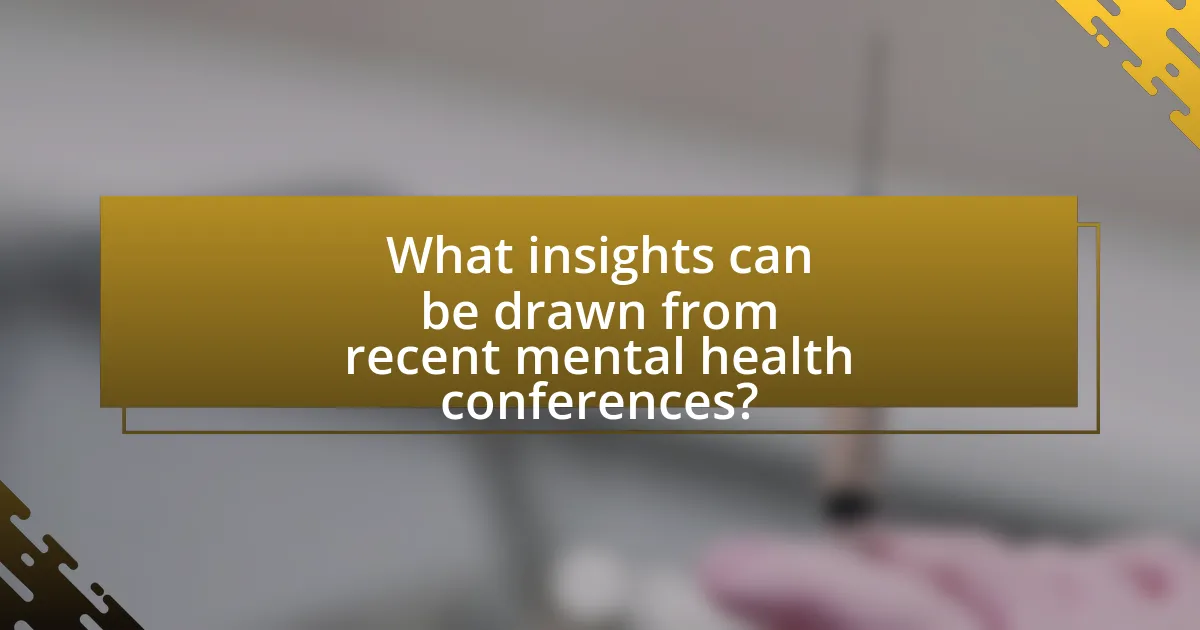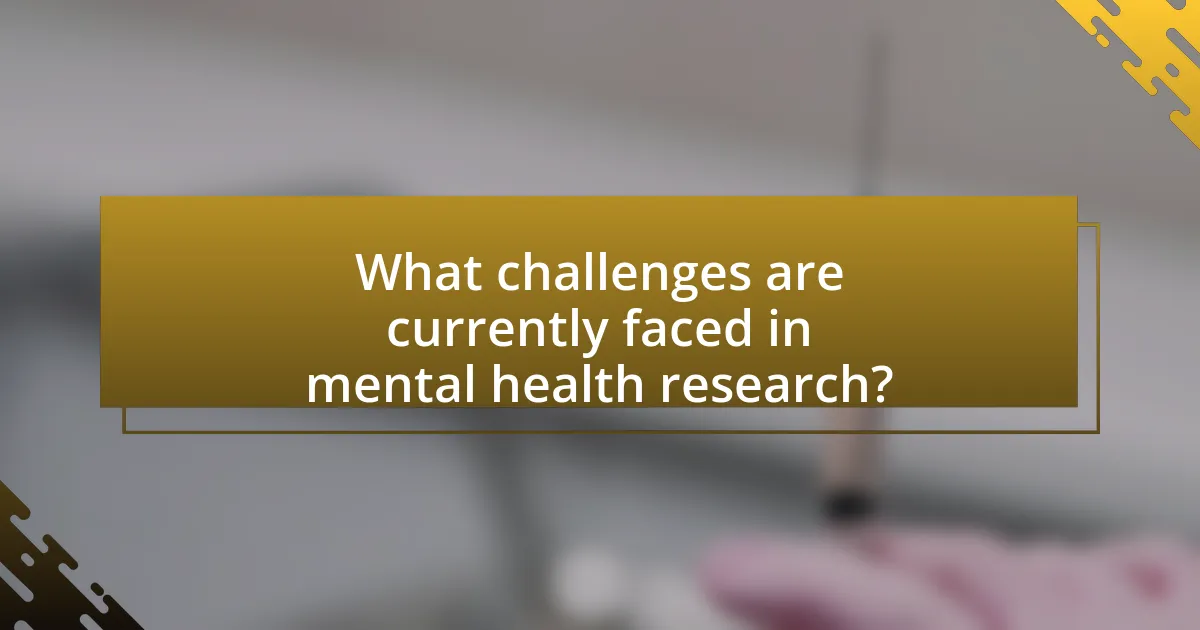The article focuses on current trends in mental health research, emphasizing the integration of technology, personalized treatment approaches, and the influence of social determinants on mental health. It highlights the role of recent conferences in shaping these trends, showcasing advancements in digital therapeutics and interdisciplinary collaboration. Key topics discussed include the impact of social media, the effectiveness of teletherapy, and the importance of integrating mental health care into primary health systems. The article also addresses the methodologies utilized in contemporary research, the challenges faced, and the ethical considerations that guide mental health studies, providing a comprehensive overview of the evolving landscape in this field.

What are the current trends in mental health research?
Current trends in mental health research focus on the integration of technology, personalized treatment approaches, and the impact of social determinants on mental health. Recent studies highlight the use of digital interventions, such as teletherapy and mental health apps, which have gained traction due to their accessibility and effectiveness. Research also emphasizes the importance of tailoring treatments to individual needs, supported by findings from the National Institute of Mental Health, which indicate that personalized approaches can significantly improve outcomes. Additionally, there is increasing recognition of how factors like socioeconomic status, community support, and cultural background influence mental health, as evidenced by studies published in journals like “Psychological Medicine.” These trends reflect a shift towards more holistic and inclusive strategies in addressing mental health challenges.
How have recent conferences shaped these trends?
Recent conferences have significantly shaped trends in mental health research by facilitating the exchange of innovative ideas and evidence-based practices among professionals. For instance, the 2023 World Congress on Mental Health highlighted advancements in digital therapeutics, which have gained traction due to their accessibility and effectiveness, as evidenced by studies showing a 30% increase in patient engagement when using these tools. Additionally, the emphasis on interdisciplinary collaboration at these conferences has led to a more holistic approach in addressing mental health issues, as seen in the integration of psychological and neurological perspectives in treatment protocols. This collaborative environment fosters the development of comprehensive strategies that are informed by the latest research findings, ultimately influencing policy and practice in the field.
What key topics were highlighted in the latest mental health conferences?
Key topics highlighted in the latest mental health conferences include the impact of social media on mental health, advancements in teletherapy, and the importance of integrating mental health care into primary health systems. These topics reflect current trends and challenges in mental health, emphasizing the need for innovative approaches to treatment and prevention. For instance, studies have shown that excessive social media use can lead to increased anxiety and depression among adolescents, underscoring the relevance of this topic in contemporary discussions. Additionally, the rise of teletherapy has been supported by research indicating its effectiveness in reaching underserved populations, thereby enhancing access to mental health services.
How do these topics reflect the evolving landscape of mental health research?
The topics discussed in recent conferences reflect the evolving landscape of mental health research by emphasizing interdisciplinary approaches, technological integration, and a focus on personalized treatment. Interdisciplinary collaboration, such as the integration of neuroscience, psychology, and social sciences, enhances understanding of mental health conditions, as evidenced by studies showing improved outcomes through combined methodologies. Technological advancements, including teletherapy and mental health apps, have expanded access to care, with research indicating that digital interventions can be as effective as traditional therapy in certain populations. Furthermore, the shift towards personalized treatment plans, supported by genetic and biomarker research, allows for more tailored interventions, which studies have shown can lead to better patient adherence and outcomes. These trends collectively illustrate a dynamic and responsive mental health research environment that adapts to emerging challenges and opportunities.
What methodologies are being utilized in contemporary mental health research?
Contemporary mental health research employs a variety of methodologies, including quantitative, qualitative, and mixed-methods approaches. Quantitative methodologies often involve large-scale surveys and randomized controlled trials to assess the efficacy of interventions, as seen in studies published in journals like JAMA Psychiatry. Qualitative methodologies, such as interviews and focus groups, provide in-depth insights into patient experiences and perceptions, which are crucial for understanding mental health conditions. Mixed-methods approaches combine both quantitative and qualitative data, allowing for a comprehensive analysis of complex mental health issues. These methodologies are supported by advancements in technology, such as digital health tools and data analytics, which enhance data collection and analysis capabilities.
How do qualitative and quantitative methods differ in mental health studies?
Qualitative and quantitative methods differ significantly in mental health studies in their approach to data collection and analysis. Qualitative methods focus on understanding individuals’ experiences, emotions, and perceptions through interviews, focus groups, and open-ended surveys, allowing for in-depth insights into mental health issues. In contrast, quantitative methods emphasize numerical data and statistical analysis, utilizing structured surveys and experiments to measure variables and identify patterns, often resulting in generalizable findings. For instance, a study published in the Journal of Mental Health Research demonstrated that qualitative interviews revealed nuanced patient experiences that quantitative surveys could not capture, highlighting the importance of both methodologies in providing a comprehensive understanding of mental health.
What role does technology play in modern mental health research methodologies?
Technology plays a crucial role in modern mental health research methodologies by enhancing data collection, analysis, and intervention strategies. For instance, digital tools such as mobile applications and online surveys facilitate real-time data gathering from diverse populations, allowing researchers to capture a broader range of mental health experiences. Additionally, machine learning algorithms analyze large datasets to identify patterns and predict outcomes, improving the understanding of mental health conditions. A study published in the journal “Psychological Medicine” by Torous et al. (2020) highlights how technology-driven approaches, including telehealth and wearable devices, have significantly increased access to mental health services and improved patient engagement. These advancements demonstrate that technology not only streamlines research processes but also fosters innovative solutions in mental health care.

What insights can be drawn from recent mental health conferences?
Recent mental health conferences have highlighted the increasing importance of integrating technology into mental health care, particularly through teletherapy and mental health apps. These conferences have showcased research indicating that digital interventions can improve access to care, with studies showing that teletherapy can be as effective as in-person therapy for various conditions, including anxiety and depression. Additionally, discussions have emphasized the need for a holistic approach to mental health, incorporating social determinants of health, as evidenced by findings that link socioeconomic factors to mental health outcomes. Furthermore, there is a growing recognition of the significance of mental health in the workplace, with data suggesting that organizations that prioritize mental well-being see improved employee productivity and reduced absenteeism.
What are the major findings presented at these conferences?
The major findings presented at recent mental health conferences include the increasing recognition of the impact of social determinants on mental health, the effectiveness of digital interventions, and the importance of integrating mental health care into primary health systems. Research indicates that social factors such as socioeconomic status and community support significantly influence mental health outcomes, as highlighted in studies presented at the World Congress of Psychiatry. Additionally, evidence from the American Psychological Association’s annual meeting shows that digital mental health tools, like mobile apps and teletherapy, have improved access and engagement in treatment. Furthermore, the integration of mental health services into primary care settings has been shown to enhance treatment adherence and reduce stigma, as discussed in findings from the International Conference on Mental Health.
How do these findings impact clinical practices in mental health?
The findings from recent mental health research conferences significantly impact clinical practices by informing evidence-based interventions and treatment protocols. For instance, advancements in understanding the neurobiological underpinnings of mental disorders enable clinicians to tailor therapies more effectively, leading to improved patient outcomes. Research highlighting the efficacy of integrated care models, which combine mental health and primary care, supports the implementation of collaborative approaches that enhance accessibility and continuity of care. Additionally, findings related to the importance of cultural competence in treatment underscore the necessity for clinicians to adapt their practices to meet the diverse needs of patients, thereby fostering better therapeutic relationships and engagement. These insights collectively drive the evolution of clinical practices, ensuring they are grounded in the latest scientific evidence and responsive to patient needs.
What implications do these findings have for future research directions?
The findings from recent conferences on mental health research suggest that future research directions should prioritize interdisciplinary approaches and the integration of technology in mental health interventions. This is evidenced by the increasing emphasis on collaborative studies that combine psychology, neuroscience, and digital health tools, which have shown to enhance treatment efficacy and accessibility. For instance, research presented at the 2023 International Conference on Mental Health highlighted the effectiveness of mobile applications in delivering cognitive behavioral therapy, indicating a shift towards digital solutions in mental health care. Therefore, future studies should focus on evaluating the long-term impacts of these technologies and exploring their scalability across diverse populations.
How are interdisciplinary approaches influencing mental health research?
Interdisciplinary approaches are significantly influencing mental health research by integrating diverse fields such as psychology, neuroscience, sociology, and public health. This integration fosters a more comprehensive understanding of mental health issues, leading to innovative treatment strategies and improved patient outcomes. For instance, studies have shown that combining insights from neuroscience and psychology can enhance the effectiveness of therapeutic interventions, as evidenced by research published in the journal “Nature Reviews Neuroscience,” which highlights the benefits of collaborative efforts in understanding complex mental health disorders. Furthermore, interdisciplinary collaborations often result in the development of holistic models that address social determinants of mental health, thereby promoting more effective public health policies.
What fields are collaborating with mental health research, and why?
Fields collaborating with mental health research include neuroscience, psychology, social work, public health, and artificial intelligence. Neuroscience contributes by providing insights into the biological underpinnings of mental disorders, while psychology offers therapeutic frameworks and understanding of behavior. Social work enhances mental health research by focusing on community and social factors affecting mental well-being. Public health plays a role in addressing mental health at a population level, emphasizing prevention and access to care. Artificial intelligence aids in data analysis and the development of predictive models for mental health outcomes. These collaborations are essential for creating comprehensive approaches to understanding and treating mental health issues, as evidenced by interdisciplinary studies that show improved outcomes when integrating these diverse fields.
How do these collaborations enhance the understanding of mental health issues?
Collaborations enhance the understanding of mental health issues by integrating diverse expertise and perspectives, leading to more comprehensive research outcomes. For instance, interdisciplinary partnerships among psychologists, neuroscientists, and social workers facilitate the exploration of mental health from biological, psychological, and social angles, thereby enriching the overall knowledge base. Research presented at recent conferences, such as the American Psychological Association’s annual meeting, has shown that collaborative studies yield more robust data, as evidenced by findings that highlight the effectiveness of combined therapeutic approaches in treating depression and anxiety. This collaborative framework not only fosters innovation but also accelerates the translation of research findings into practical applications, ultimately improving mental health interventions and policies.

What challenges are currently faced in mental health research?
Current challenges in mental health research include a lack of funding, difficulties in recruiting diverse study populations, and the stigma surrounding mental health issues. Funding constraints limit the scope and scale of research projects, as evidenced by the National Institute of Mental Health reporting a significant gap between funding needs and available resources. Recruitment challenges arise from the need for diverse representation in studies, which is crucial for generalizability but often hindered by logistical and social barriers. Additionally, stigma can deter individuals from participating in research, impacting the validity of findings and the development of effective interventions.
How do funding and resource allocation affect mental health studies?
Funding and resource allocation significantly impact mental health studies by determining the scope, quality, and quantity of research conducted. Adequate funding enables researchers to explore diverse mental health issues, implement comprehensive methodologies, and recruit larger sample sizes, which enhances the validity of findings. For instance, the National Institute of Mental Health (NIMH) allocates billions annually, influencing the breadth of studies on conditions like depression and anxiety, thereby shaping treatment approaches and public health policies. Conversely, limited funding restricts research opportunities, leading to gaps in knowledge and understanding of mental health disorders. This correlation between funding levels and research output is evident in the disparity of studies on prevalent conditions versus less common disorders, highlighting how resource allocation directly affects the advancement of mental health research.
What strategies can be implemented to overcome funding challenges?
To overcome funding challenges in mental health research, organizations can implement diversified funding strategies, including seeking grants from multiple sources, engaging in public-private partnerships, and leveraging crowdfunding platforms. Diversifying funding sources reduces reliance on a single entity, thereby increasing financial stability. For instance, the National Institutes of Health (NIH) reported that multi-source funding can enhance project viability and sustainability, as evidenced by the increased number of successful grant applications in collaborative research initiatives. Additionally, public-private partnerships have been shown to facilitate resource sharing and innovation, as seen in the collaboration between pharmaceutical companies and academic institutions, which often leads to more robust funding opportunities. Crowdfunding has also emerged as a viable option, with platforms like GoFundMe enabling researchers to directly engage with the public and secure small donations that collectively support significant projects.
How does the stigma surrounding mental health impact research efforts?
The stigma surrounding mental health significantly hinders research efforts by discouraging individuals from participating in studies and affecting funding availability. This stigma leads to underreporting of mental health issues, as individuals fear judgment or discrimination, resulting in a lack of comprehensive data necessary for effective research. For instance, a study published in the journal “Psychological Medicine” found that stigma can reduce the likelihood of individuals seeking help, which in turn limits the sample size and diversity in mental health research. Additionally, funding agencies may prioritize other health issues perceived as less stigmatized, further restricting resources allocated to mental health studies.
What ethical considerations are paramount in mental health research?
In mental health research, paramount ethical considerations include informed consent, confidentiality, and the minimization of harm. Informed consent ensures that participants understand the nature of the research, its risks, and their right to withdraw at any time, which is critical for respecting autonomy. Confidentiality protects participants’ personal information, fostering trust and encouraging participation. Minimizing harm involves assessing potential risks and ensuring that the benefits of the research outweigh any adverse effects, as emphasized by the Belmont Report, which outlines ethical principles and guidelines for research involving human subjects. These considerations are essential for maintaining ethical integrity and promoting the welfare of participants in mental health studies.
How are researchers ensuring participant safety and confidentiality?
Researchers ensure participant safety and confidentiality by implementing strict ethical guidelines and protocols throughout the research process. These measures include obtaining informed consent, where participants are fully aware of the study’s purpose, procedures, and potential risks. Additionally, researchers utilize anonymization techniques to protect personal data, ensuring that individual identities cannot be linked to their responses. For instance, the American Psychological Association emphasizes the importance of confidentiality in research, mandating that data be stored securely and accessed only by authorized personnel. Furthermore, regular training on ethical standards for researchers helps maintain a high level of awareness regarding participant rights and safety.
What guidelines are in place to address ethical dilemmas in mental health studies?
Guidelines addressing ethical dilemmas in mental health studies include the American Psychological Association’s Ethical Principles of Psychologists and Code of Conduct, which emphasizes respect for individuals’ rights, integrity, and responsibility. These guidelines mandate informed consent, confidentiality, and the minimization of harm to participants. Additionally, the Belmont Report outlines principles such as respect for persons, beneficence, and justice, which serve as a foundation for ethical research practices. These frameworks ensure that mental health studies prioritize participant welfare and ethical integrity, as evidenced by their widespread adoption in research protocols across various institutions.
What practical steps can researchers take to stay updated on trends?
Researchers can stay updated on trends by regularly attending relevant conferences, subscribing to academic journals, and engaging with professional networks. Attending conferences such as the American Psychological Association Annual Convention allows researchers to hear about the latest findings and methodologies directly from experts in the field. Subscribing to journals like the Journal of Mental Health provides access to peer-reviewed articles that highlight emerging trends and research developments. Additionally, participating in professional networks, such as the Society for Research in Psychopathology, facilitates collaboration and information exchange among peers, ensuring researchers remain informed about current trends and advancements in mental health research.
How can attending conferences enhance a researcher’s knowledge and network?
Attending conferences enhances a researcher’s knowledge and network by providing access to the latest research findings and facilitating connections with other professionals in the field. Conferences often feature presentations from leading experts, workshops, and panel discussions that expose researchers to innovative methodologies and emerging trends, particularly in areas like mental health research. For instance, the American Psychological Association’s annual convention showcases cutting-edge studies and offers networking opportunities with over 10,000 attendees, allowing researchers to exchange ideas and collaborate on future projects. This direct engagement with peers and thought leaders fosters professional relationships that can lead to collaborative research efforts and increased visibility in the academic community.
What resources are available for ongoing education in mental health research?
Ongoing education in mental health research is supported by various resources, including online courses, webinars, and professional organizations. For instance, the American Psychological Association offers continuing education programs that cover the latest research and practices in mental health. Additionally, platforms like Coursera and edX provide access to courses from universities that focus on mental health topics, allowing professionals to stay updated on current trends and findings. Furthermore, attending conferences such as the Annual Meeting of the American Psychiatric Association provides opportunities for networking and learning from experts in the field. These resources ensure that individuals engaged in mental health research can continuously enhance their knowledge and skills.

Leave a Reply